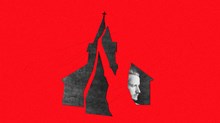U.S. prison officials have removed hundreds of religious texts, including Christian discipleship materials, from prison chapel libraries in an effort to prevent religious extremism.
Inmates of the minimum-security prison camp at Otisville Federal Correctional Institution in New York filed suit after they found the library missing 600 titles on Memorial Day, the Associated Press reported.
"The set of books that have been taken out have been ones that we used to minister to new converts when they come in here," Christian inmate John Okon told a judge last week, according to the news service. Okon, along with inmates Moshe Milstein and Douglas Kelly, are asking the court to order the titles returned to the prison chapel library.
The library cull was in response to an April 2004 Department of Justice review of U.S. prisons' recruitment and use of Muslim chaplains.
The Department of Justice's Office of the Inspector General commissioned the report in 2003 in response to U.S. senators' concerns that Muslim chaplains were recruited only from the Islamic Society of North America (ISNA) and the Graduate School of Islamic and Social Sciences (GSISS). Sen. Charles Schumer, D-N.Y., alleged that that the organizations are connected to terrorism and Wahhabism. DOJ researchers found that recruitment and supervision of Muslim religious service providers was deficient and that a form of "prison Islam," sometimes radical, thrives in the absence of chaplains. However, the Federal Bureau of Prisons (BOP) has not accepted an ISNA candidate since 2001, and the GSISS has never endorsed a U.S. prison religious worker.
In one of its 16 recommendations for the BOP, the DOJ suggested that officials screen chapel books and videos and maintain a central registry of acceptable materials.
Although the report did not make recommendations for non-Muslim religious materials, the BOP is removing resources of all religions from federal prisons across the United States.
BOP spokeswoman Traci Billingsley said the bureau is standardizing chapel library titles throughout the federal prison system. "As books are reviewed and certified as free of discrimination, violence, and radicalization, the lists for each religion will be updated to incorporate additional books into the standard libraries," said Billingsley. The books pulled from the shelves have been placed in storage, not thrown out, she said.
BOP religious advisors were asked to certify 100 to 150 books in their area of expertise that provided "religiously reliable teaching" and would not encourage violence or radicalism. The books they selected remain in prison chapel libraries; prison officials removed all other titles.
The BOP is now working to complete a list of acceptable religious books of all faiths, which will not be available until October. After its initial release, the list will be updated and released annually, said a BOP representative.
Religious liberty groups are divided over the cull.
Steven Freeman, associate director of civil rights for the Anti-Defamation League, applauds the measures as limiting extremism in prisons.
"It's a legitimate concern that the government has in terms of what books are available to prisoners," he said. "Hopefully that decision is made with some good discussion and good discretion about what is extremist and what is mainstream."
Prison Fellowship Mark Earley agrees that inmate radicalization is a problem, but says the BOP's solution is overly broad.
"I think there is a more precise method to deal with the concerns of radical literature in prisons without dictating to each faith group a limited number of books allowed in the libraries," he said. "Ninety-nine percent of these books in prison chapel libraries of all faiths are fine."
Freeman disagrees. "The legitimate goal is to keep the extremist literature out," he said. "Beyond that, [prison officials] should be looking to build a serious collection with experts in that particular religion. They ought to also afford the prisoners the opportunity to supplement their collection by purchasing specific volumes they may want."
John Whitehead, president of the Rutherford Institute, said the BOP is trying to fight crime with crime. "I don't see any redeeming factor in committing illegal acts, unconstitutional acts. It's the old book-burning thing again," he said. Under the Religious Land Use and Institutionalized Persons Act, he notes, "Any regulation by a prison that substantially burdens an inmate's right to free exercise, they have to show a compelling state interest [to carry out]." Referring to an inmate's example of a book that had been removed, Whitehead asked, "What is the compelling state interest to remove Why Bad Things Happen to Good People? Or the Christian books?"
Copyright © 2007 Christianity Today. Click for reprint information.
Related Elsewhere:
The International Herald Tribune posted an Associated Press article covering the events at the Otisville prison.
The Anti-Defamation League website has a post providing answers to questions concerning prison extremism and the First Amendment.
The BOP released a review on Muslim religious service providers in April 2004.
One of the goals of the Rutherford Institute is to protect religious freedom.
Prison Fellowship is working to counter this censorship. The organization also works in prisons across the country to spread the gospel to inmates.
Other Christianity Today articles about religious books banned from federal prisons:
Rx for Recidivism | Prison Fellowship president Mark Earley talks about challenges the ministry faces.
Bad Judgment | Ruling imperils faith-based programs around the country. (Charles Colson, August 1, 2006)
Imprisoned Ministry | The future of Prison Fellowship's rehabilitation program, and other faith-based social services, are in the hands of an appeals court (July 14, 2006)
Study Lauds Prisoner Program | Prison Fellowship releases InnerChange research at a White House roundtable. (June 1, 2003)
Suing Success | Prison Fellowship says its Inner Change program is clearly constitutional (April 1, 2003)
A Healthy Cult | A lively response by one unusual audience shows how God's power transforms culture. (Charles Colson, June 12, 2000)
Weblog: Christian Prison Program Sued (February 1, 2003)
Prisons: Unique Prison Program Serves as Boot Camp for Heaven (February 9, 1998)

Support Our Work
Subscribe to CT for less than $4.25/month


















